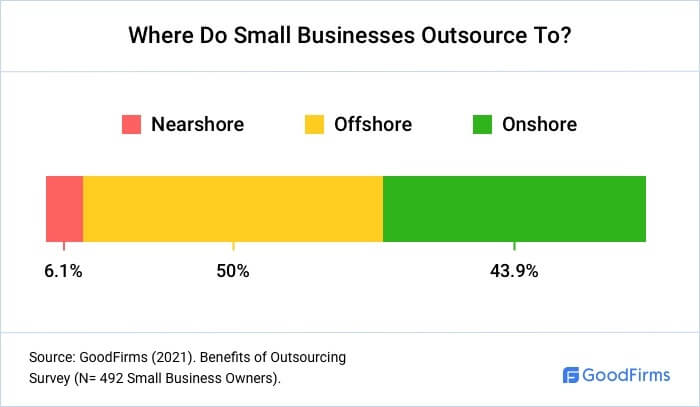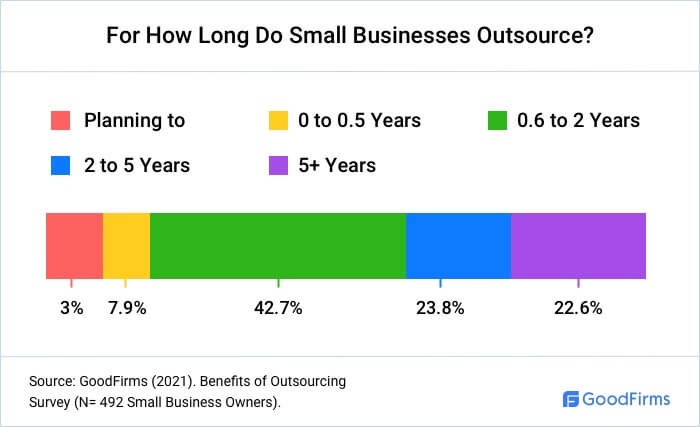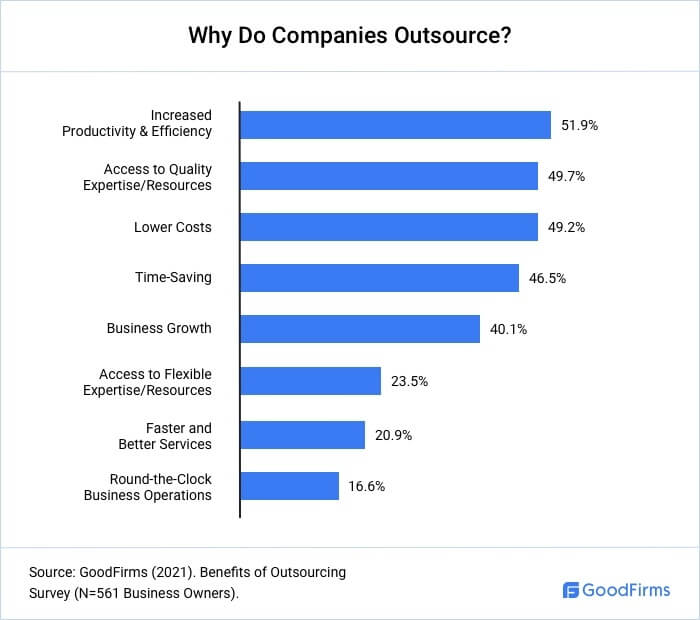Most businesses outsource some extent of their processes. It is a practice of assigning specific business functions, mostly non-core, to a third party. Large companies such as Google, Alibaba, AppSumo, Whatsapp, Skype, etc., have relied on this business strategy to fuel the growth. Startups and SMBs are also keen on reaping the benefits of outsourcing to move faster.
The current social and economic climate has prompted the rise in remote work. This has made entrepreneurs realize that an in-office team is not a success criterion. More and more SMBs appreciate that they do not have to limit themselves to their city or country.
Now they are increasingly delegating tasks to companies anywhere in the world that have resources, experts, and advanced technologies. Each business has its own reasons for outsourcing. The key is in understanding what services are necessary for growth but challenging to be achieved on-site and will be carried out better by outsourcing.
Goodfirms surveyed 561 business owners to know how delegating tasks to the outsourcing partners can help on the larger company mission. Read the research to find the advantages of outsourcing for small businesses.
Where Do SMBs Outsource Their Business Process?
Almost every industry, including manufacturing, banking and financial services, retail, telecommunication, IT, healthcare, defense, and even governments, uses outsourcing in one way or another. As SMBs have limited resources than large companies, it is more important for them to capitalize on comparatively compact workplaces. They have to be tech-savvy and figure out what services to outsource and where to.
There are 3 main ways to outsource services, based on the geographical distance between the two parties: the client and the outsourcing service provider. Depending on the requirements, one may be preferable over another.
- Nearshore - Delegating work or services to people in a neighboring country or one in the same time zone.
- Onshore - Assigning work or services to another company/individuals within the company's own country.
- Offshore - Passing work or services to third-party providers in more distant lands, overseas, mainly in a different time-zone.
Goodfirms research reveals that the majority of the entrepreneurs prefer onshore or offshore over nearshore. 50.0% of the businesses do offshoring, 43.9% onshoring, while only 6.1% opt for nearshoring.

Offshoring companies from India, Malaysia, the Philippines, and Brazil have dominated the outsourcing industry for a long time. Though they now face some challenges from onshore companies.
"In the past, I've used contractor teams in India, The Philippines, and Malaysia that were much cheaper per hour and for overall projects,” says Richard Williamson, Chief Marketing Officer at Citizens High School.
He says "There are management, supervision, and quality assurance issues sometimes with offshore contractors, but those become less difficult with time and experience. The biggest problem that still remains is the time difference if the offshore team is not working the same hours as the hiring company. We've experienced considerable lag time on time-sensitive turnarounds. In the course of normal, non-emergency business, this isn't much of a problem if, from the start, you set up reporting and management structures that consider these issues.
The company now has hired two outsourced contractors for online app development. One is entirely US-based and the other subs to a team in Pakistan. And the prices are about the same. Largely because we are going through domestic companies or managers to get the work done."
Also, in recent years, cloud computing has grown rapidly as an advanced form of outsourcing. Here third parties provide IT-related functions over the Internet or a proprietary network — for example, Software-as-a-Service (SaaS), Infrastructure-as-a-Service (IaaS), and Platform-as-a-Service (PaaS). Then, there are Managed Services, where businesses can contract with a third party that provides network management functions.
How Long Do Businesses Outsource?
Today, numerous SMBs focus on their core competencies while outsourcing the functions for which they do not have competence internally. Factors such as limited resources, lack of proper marketing experience, etc., often make short-term outsourcing an ideal choice for small businesses, mainly when companies themselves are dealing with short-term projects.
However, once everything settles in and the company starts acquiring more customers, it gets more idea of how invested it is in the business and how quickly it would like to grow. So, even though short-term outsourcing might provide quick fixes and immediate resolutions, eventually, most companies transition to long-term outsourcing. It gives several benefits, such as a strong relationship with an outsourced team, giving providers more opportunities to learn more about a particular brand and having a precisely tailored service, etc.
46.4% are using this practice for more than 2 years, selecting to outsource for longer.

Toby Walker, Managing Director at Workshop Marketing, recalls how his company started outsourcing their IT development and maintenance services ten years ago.
Toby says, "Not long after starting our business ten years ago, we found ourselves with more website development work than we could reasonably cope with, coupled with looming deadlines. We could have managed the workload in-house, but it would mean very long hours for quite an extended period and left zero excess capacity in the agency.
That left us with a choice of recruiting new team members or outsourcing. Given the timeframe, we chose to outsource, and it was one of the best decisions we have made as a business."
What Are The Benefits Of Outsourcing?
The global outsourcing market amounted to a whopping 92.5 billion U.S. dollars in 2019. Today, lockdowns, the shutdown of certain businesses, and work from home edicts have disrupted normal outsourcing operations. Many companies have reevaluated their outsourcing strategies. Some might prefer to increase outsourcing to deal with higher demands or lack of on-site resources. Some businesses might consider distributing services among different providers with separate locations.
Every business, small or large, faces some standard challenges while starting a business, such as hiring the right people, developing a customer base, building a brand, and so on. As a result, a great many SMBs and startups are offering more business to outsourcing service providers.
According to the Goodfirms survey, 51.9% of the businesses outsource to have increased productivity & efficiency, while 49.7% of the companies employ this process to access quality expertise/resources.

Here are the 8 main advantages of outsourcing.
1) Increased Productivity & Efficiency
A competent outsourcing partner specializes in the specific process or service. They have years of experience delivering complex to routine projects. Their knowledge and understanding of the domain lead to increased productivity and efficiency and contribute to the company's bottom line.
Also, it frees in-house resources to use tacit knowledge over implicit one. They can concentrate on the tasks they are better positioned to do.
"51.9% of the surveyed business owners favor outsourcing to increase productivity and efficiency."
"At Noémie, we know how to handcraft quality jewelry and remove friction when it comes to buying fine jewelry. We try to focus on what we are best at and leverage other partners who can help deliver impact where it's needed," says Yuvi Alpert, Founder and CEO of Noémie.
He says, "For example, at an early stage of the business, to unlock data-driven growth in an industry that typically is not data-driven, we partnered with a team of experts in very different industries. These people were thought leaders in business intelligence and lean database architecture. Together we created easy-to-use, automated dashboards that are saving my team a ton of valuable time. So we can focus on running the business while gaining immediate analytical insights into business performance and customer behavior.
By outsourcing functions, we ensure that these essential functions are done correctly with experts that also work with companies in other categories. This allows us to have a larger picture and better learnings from outside of the jewelry industry while allowing ourselves to focus on the core of our business."
2) Access to Quality Expertise and Resources
Having an extensive pool of knowledge is a vital strategic asset for an enterprise. While, factors such as cost, affordability, and unavailability of skilled resources in the vicinity might prevent companies from hiring experts as full-time employees. Drawing on experts with niche skills can substantially improve a business's performance.

"With the increased competition in our niche, EasyMerchant is shifting towards employing an outsourced marketing agency to enhance our digital appeal to the market. Outsourcing to a marketing agency will replenish our company with fresh new ideas and strategies that will contribute to our overall business agility. It will also allow us access to advanced and better technologies that will increase our marketing aspect's productivity," says Stacey Kane from EasyMerchant.
She adds, "Additionally,
- This outsourcing move will set the company up with a new stream of creative and expert resources that can lower our costs and overhead expenses than in-house employee reskilling and re-training.
- Expert marketing agencies will deliver sizable growth fast as there will be no need for a learning curve consideration.
- This decision is a powerful move for our company as we can finally place our marketing functions on autopilot and leave them in the hands of trustworthy and competent specialists. The kicker is that we can benefit from all the marketing gains without being concerned with expanded staffing issues."
Stefan Chekanov, CEO of Brosix, chose to outsource mainly because of the increase in workload that required them to invest more resources in a short time.
He elaborates, "I don't think just on material resources - we had to spend a lot of time on training and introducing new workers to our company, and this was challenging.
- I felt that we needed to hire professionals who could help our business grow, apart from completing individual activities in the accounting area, for instance.
- I wanted a fresh look at the business and a chance to consult with experts regarding our finances or opportunities for expansion.
- Plus, we actually made several investments based on the current situation in our industry, and we could rely on the agency to help us choose the best course of action without risking too much."
"Outsourcing enables you to tap into a wider pool of talents than just what's available to your local vicinity. For example, you need a graphic designer for a project. If you only consider hiring who's available in your own city, you're limiting your options. Whereas when you open your business to the possibility of outsourcing, you also open yourself to the possibility of hiring the best graphic designer in the country or even the world. You'd be surprised that a graphic artist with mind-blowing abilities located in Bulgaria will only cost less than half the salary of a domestic graphic artist who may only be half as good," says Phillip Lew, CEO of C9 Staff.
3) Lower Costs
A significant way to survive a business downturn is to reduce overhead costs that are associated with running day-to-day operations. These fixed expenses include rent/mortgage payments, salaries and associated payroll costs, depreciation on fixed assets, liability and other insurance, etc. By outsourcing services to a low-cost country, one gets access to quality services at a much lower cost and decreases the overhead costs.
"49.2% of the surveyed entrepreneurs invest in outsourcing to reduce labor costs and overhead expenses."
"For shorter term projects, it is much more cost-effective to hire out for development. The same amount of money we'd pay an in-house hire could buy the time of three or four professionals doing targeted work," says Richard Williamson.
He adds, "From a job function perspective, when we needed an expert in a particularly narrow tech field, we found we could hire someone who could do the job and then let the rest of our contract team integrate their work to that element as needed. In reality, if we had an inside person for some of those projects, we'd still be hiring out for that specialized piece, so we would have come to the same place eventually, but at a higher cost in salary, benefits, and workplace coffee!"
Lauri Kinkar, CEO of Messente, has outsourced bookkeeping services. He says, "What's good about outsourcing bookkeeping services is that it is cost-effective. When you hire a virtual bookkeeper, you only have to pay for the services rendered while hiring an in-house bookkeeper involves paying for their insurance, providing benefits, and you should also consider the administrative expenses."
He adds, "The pandemic has affected every industry greatly and the way to keep your business going during these trying times is to reduce expenditure and maximize resources. By hiring a virtual bookkeeper, you get to save your time and resources as well."
Andriy Bogdanov, CEO and Co-Founder of Online Divorce, plans to outsource their digital marketing services. He says, "The main reason I have for outsourcing is the cost. Through outsourcing, I can get a dedicated PPC manager for less than what I can hire locally while still expecting the same rate of production for even greater results. By outsourcing my digital marketing team, I am able to devote the majority of my capital to having a customer service team here in my home office and any customer-facing aspects of my business."
4) Save Time
SMBs that are just starting, or hoping to grow, can outsource processes such as content creation, admin and filing, invoicing, social media management, email marketing, etc., and free up the time to focus on business-critical tasks. The tasks taken off the desks go into the hands of a specialist. So, a simple briefing to the augmented team is often sufficient, eliminating the need for review meetings and prolonged planning, saving further time on project management.

Kayla Klein is CEO at Kreativ Alchemy that specializes in branding. She says, "Now and then, we get a potential client who needs a little bit more than branding. For example, they might want our help developing their brand, and then they might need social media management to maintain the image we create. We never say 'no' to potential new business, but we don't do social media management in-house. It'd take too much time since we're juggling branding projects for 10+ other clients at a time.
When we try to do everything for a client, we get to keep 100% of the profits. But we end up working 20 hours a day, putting other projects on the back burner, and having no time for client acquisition.
Instead, if we outsource the projects that don't align with our major service offerings, we save ourselves more time for our other clients, grow our company, and have a work-life balance. Time is money, and I can guarantee that when we're working 20+ hours a day to keep everything in house, we're not getting paid our typical rate for all of that overtime."
5) Business Growth
Irrespective of its size or budget, every business looking to grow gets benefited by outsourcing. SMBs and startups can potentially be overwhelmed by the large volume of work needed for expansion. Particularly if they cannot afford a large team or the technology required to support various business functions. With outsourcing, a company in a period of growth can focus on core tasks such as building the products or services, marketing strategies, etc. Meanwhile, they can be assured that essential support activities like customer service are in capable hands.
"40.1% of the surveyed business owners outsource services to achieve business growth."
"One of the important reasons why companies outsource is expansion. A lot of companies nowadays want to expand their services, client reach, and market footprint without the corresponding increase in payroll costs and overhead. So how do they do it? Hiring an extra 10 professionals domestically, providing all of them with work equipment and workspaces, and offering benefits on top of salary can be exorbitant at times. Instead, they can just outsource and be able to spend half of their expansion budget for twice the expansion size," says Phillip Lew.
6) Access to Flexible and Diversified Resources
Every so often, even the most well-planned projects might abruptly fall behind schedule or under a time crunch because of minor errors, changes in plans, or some incidental activities. At that time, businesses can use flexible and diversified resources to give the project the necessary push and meet the changing circumstances. So, while looking for an outsourcing partner, entrepreneurs need to identify a company that remains flexible enough to adapt to the change.

"In my opinion, the biggest reason to outsource IT management is to leverage an IT firm's diverse team. If you hire just one in-house, go-to person for all your IT needs, you are limited to that one person's knowledge. However, when you outsource, if your primary contact can't diagnose an issue, there is a very good chance someone on their team is going to have the relevant knowledge," says John Ross, CEO of CPA Prep Insights.
He adds, "The diversity of an outside IT team's knowledge has great value. Another major reason to outsource IT management is to stay on top of the latest trends and cyber risks. The firm that handles your IT management is much more likely to stay on top of the latest industry updates than your one in-house team member. It is their job to eat, breathe and sleep these issues, so you should be able to take solace knowing your IT firm is providing services based on what they are seeing in the market."
Vincent Bradley, CEO & Co-Founder of Proper Wild, believes that a combination of resource management and staying flexible makes working with consultants an effective strategy for startups.
He says, "When you work with consultants, you don't have to worry about all of the time and money you invest in hiring a full-time employee, and you can adjust your resources based on your companies' immediate needs. This is really useful when you're trying to stay lean and experiment to figure out what's working and not working before you commit to hiring full-time team members."
7) Faster and Better Services
It is pivotal to quickly innovate and be first in the market in today's world, whether it is product manufacturing or software development. With a shorter time-to-market, entrepreneurs can respond to market demand faster. It is quicker to scale an augmented team to carry out the work than letting available resources dictate the timelines. Service offerings become better with high-quality deliverables in a short duration. Certain business functions such as customer service & lead generation, shipping & logistics, sales & marketing, content creation, etc., can be carried out quicker by assigning them to an accomplished outsourcing partner.
"20.9% of the surveyed entrepreneurs believe in outsourcing to provide faster and better services."
"The main reason we outsource blogging is simply because we aren't writers and writing doesn't come easy for us. A piece that takes a writer 8-12 hours to write would probably take us an entire week or even more to get it completed. Writing just comes easy for some people, but for us it's a lot of staring at a blank screen," says Kelly Shoul from In Love and Adventure.
She adds, "When you're trying to rank on google results for specific keywords in a competitive market, it's important to put out high quality blogs consistently, and when you're not a writer, this could take up too much of your time. I believe it's important for business owners to focus on the tasks where they're good at, and outsource areas they're not."
8) Round-the-clock Business Operations
Delegating services to the companies that operate in a different time zone ensures that business processes happen non-stop. With online businesses, there is no such thing as 'business hours.' For example, even though physical office space shuts down, customers and potential clients expect access to the business 24/7. By outsourcing, business always remains 'open' for any type of customer interaction, whether it is about leaving reviews on a third-party site or engagement on social media channels.

"Being available to potential clients in every way possible is necessary for our business to survive. We learned early on when we opened our firm that missed calls outside of work hours could cost us dollars. Then, with the onset of COVID and the subsequent loss of overflow leads from bigger firms, we realized investing in marketing was of the utmost importance," says Jordan W. Peagler, Owner of MKP Law Group, LLP.
He adds, "New clients are the lifeblood of a surviving business. With a small firm like ours budgets are tighter and we only spend money where we know it will end up bringing us value. We also invest in light administrative tasks to keep our digital files organized and around-the-clock call answering services. A missed call is a missed client that can cost us potentially thousands of dollars in attorneys' fees."
Conclusion
The benefits of outsourcing are not limited to cost savings only. As the business grows, outsourcing can be a perfect way to promote innovation; access new skill sets to reposition the company in the market, and disrupt the industry. Each business carries a certain amount of risk due to the constant changes in markets, government regulations, financial conditions, and technologies. With expert knowledge of security and compliance issues, outsourcing professionals are better at avoiding and managing the risk in their areas of expertise.
Companies are adopting various cost-cutting measures in light of Covid-19. However, they still prefer outsourcing to keep the wheels rolling. A survey from May 2020 found that 58.8% of marketers saw no change in outsourcing marketing activities due to the pandemic, while 19.4% saw increased outsourced marketing activities. Though finding the perfect outsourcing partner can be challenging. You need to decide where to outsource and how much can be spent, evaluate the vendors' proposals, and weigh benefits and risks. Pay heed to what a management consultant, Peter Drucker, rightly said, 'Do what you do best and outsource the rest!'
About Goodfirms Survey on Benefits of Outsourcing
Goodfirms surveyed 561 business owners worldwide to study their outsourcing practices.
We sincerely thank our Research Partners for helping us garner participants and give a peek into today's entrepreneurs.
A mix of senior level executives and business process managers participated in this survey. These included Founders/Co-founders (26.7%), CEOs (25.7%), Owners (20.9%), Managers (13.4%), Directors (4.3%), Presidents (2.1%), VP (1.1%), Digital Marketers (0.5%), Editors (0.5%), and other executives (4.8%).
These respondents belonged to various sizes of companies - 87.7% of Small Businesses (1-49 employees), 10.7% of Medium Businesses (50-249 employees), and 1.6% of Large Businesses (250+ employees).
* For any queries, drop an email to [email protected]
- 3devo
- 3veta
- A Self Guru
- Advanced Inheritance
- Advertising for Surgeons
- Affiliate Dove
- Alexandra Pedro Marketing
- Alexis Haselberger Coaching and Consulting, Inc
- Alight
- Andes Academy
- Animalso
- Arize Financial & Insurance Group
- Asaa88
- Association of Virtual Assistants
- Avidon marketing Group
- Ayokay
- BBQ Grill Academy
- Bemana
- Better Topics
- BHMR
- Boot Mood Foot
- Boston Trading
- Bredemarket
- Brosix
- Business Builder Mag
- Buy Sell Empire
- ByPeople
- C9 Staff
- Caffeinated Face
- Career Baboon
- Carnivore Style
- Castillo Miguel
- Celstial Wealth Management
- Chilli Fruit Web Consulting
- Citizens High School
- Cloud Employee
- Cloudzat
- Cocodoc
- CocoFinder
- Concrete Candles
- Condo Control
- Conexa
- Contract Hound
- CPA Exam Guy
- CPA Prep Insights
- Creation Business Consultants
- CyberCrew
- D R D Enterprises Inc of Davie
- Designer Wear
- DH Home Solutions
- Disco
- Diving Bell Creative
- dofollow.io
- Dora Wirth (Languages) Ltd.
- EasyMerchant
- English Blinds
- Envizion Advertising LLC
- Essie Button
- Eye7 Chaudhary Eye Centre
- Eyedo
- Eyeful
- Fearless Business
- Field Pros Direct
- Financer
- Five Barks
- Fix The Photo
- Floor Shields
- Flooring Masters
- Florida Peninsula Insurance Company
- Force by Mojio
- Go Visa Free
- GoldIRASecrets
- HeadsetPlus
- Helen Nuttall
- Her.CEO
- Holly + Co.
- Ideodyssey
- Impact Energy Ltd
- In Love and Adventure
- Indebted mom
- Jessica Doman llc
- Kasera
- Kevmrc
- Kreativ Alchemy
- LG Solutions
- London Chartered Surveyors
- Mailcharmer
- Manhattan Miami Real Estate
- Marquis Gardens Ltd.
- MaryRuth Organics LLC
- Mavens & Moguls
- Meetanshi
- Meg K and Company
- Melissa Swink & Co
- Memmzy Inc
- Messente
- MicroAge Kitchener
- Mid Florida Material Handling
- MKP Law Group, LLP
- Mold Busters
- Moriti Private Safaris
- Mostly Blogging
- Mylo-Unleather
- myPOS
- Myprocesses
- Net Lawman
- Nikola Roza
- NoDegree
- Noémie
- Number For Live Person
- Offices
- Oklahoma Smokes
- One Shot Finance
- Online Divorce
- Out of the Box Innovations Ltd.
- Outstanding Foods
- Overhorizon Media
- Painless Home Buying
- Paper Chaser Biz LLC
- Pearl Lemon
- Pocketbook Agency
- powerphrase
- Price Benowitz LLP
- PriceListo
- Prime Plus Mortgages
- Profitable Venture
- Proper Wild
- Pror Marketing
- Rainbow Chameleon Corp.
- Redeem Tech
- Remarkable Land
- Rent-a-Wheel
- RMTM
- ROAMS Support Services LLC
- Rooftop Designs
- RoverPass
- RushOrderTees
- Sabre Limited
- Safe Drive Gear
- Sammy Belose
- SEO Geek Lab
- Shotkit
- Slingshot
- Solution Scout
- Sourcery
- Squeeze
- Stockarea
- Talk Travel
- TautUSA
- The Bottom Line Group
- The Critter Depot
- The Forked Spoon
- The Mood Lab
- The Stock Dork
- The Website Flip
- The Whit Group
- Tielloodgieter
- Titoma
- Trustana
- Ukulele Tabs
- Value Hunta
- Value Transformation
- VelvetJobs
- Virtudesk
- ViscoSoft
- Vivipins
- We Buy Houses In Kentucky
- Wealth Awesome
- Webconsuls
- Wendy J Young
- Win The Hour Win The DAy
- Workshop Marketing
- Writer's Life for You, LLC
- Writing Real Estate
- Zety
- Zoewebs Sdn Bhd









